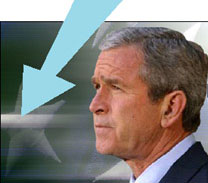JIM.LOBE
Powerful neocon brotherhood begins unraveling (FCN, 03-15-2006)

WASHINGTON (IPS/GIN) – As President George Bush’s standing in public opinion polls plumbs new depths, his fellow Republicans are finding it ever more difficult to maintain their unity on key hot-button issues such as foreign policy, immigration and civil liberties.
Intra-party differences that were successfully muted by the party’s rallying behind the President and his image as a strong, decisive leader after the Sept. 11, 2001 attacks on New York and the Pentagon have re-emerged. The imminence of next November’s midterm congressional elections is contributing to the party’s growing incoherence.
With Democrats recruiting an unusually large number of viable candidates to contest competitive seats, many incumbent Republicans must decide whether to remain tied to the mast of Pres. Bush’s seemingly sinking ship, or break loose in order to reassure increasingly pessimistic voters that they, too, have grave reservations about where he has been sailing.
Recent polls show an unexpected erosion of support for Pres. Bush–due in major part to the growing perception that he is incompetent–among bedrock Republicans, as well as independents.
“Competence is not a partisan issue,” wrote Alan Abramowitz, a political scientist at Emory University in Atlanta, in the Mar. 5 edition of Washington Post. “(T)here is growing concern among Republicans that they could lose their grip on both chambers if the midterm election turns into a referendum on a president with approval ratings in the thirties or worse.”
Unity began to fade after Pres. Bush 2004 re-election, largely due to the steadily growing impression that, despite the administration’s repeated assurances, the Iraq war was not going well and that he did not have a viable “exit strategy.” His ratings steadily slipped, reaching their previous nadir shortly after Hurricane Katrina devastated New Orleans, exposing a level of incompetence and lack of preparation on the part of the administration that few had imagined.
Older Republican ideological divides began to re-emerge. First, in the debate over Pres. Bush’s calls for a “Marshall Plan” to rebuild the city. Deficit hawks and anti-tax groups, who had remained faithfully by his side despite the steady accumulation of unprecedented federal deficits, accused him of FDR-like profligacy that threatened to drive the country to ruin.
Pres. Bush’s economic policies have since become a major source of contention within the party, especially since the February publication by a heavyweight Republican economist, Bruce Bartlett, of a blistering and already best-selling critique entitled “Imposter: How George W. Bush Bankrupted America and Betrayed the Reagan Legacy.”
One month later, a second breach–this time with the Christian Right–opened with Pres. Bush’s nomination of White House Counsel Harriet Miers to the Supreme Court. Lacking assurances that she was a trusted follower of their creed on the bench, the movement assailed Pres. Bush for picking a “crony” with dubious credentials and eventually forced her to withdraw her name.
In the last two months, however, internal tensions have become clearer than ever. The growing pessimism about the Iraq war has driven a growing number of influential conservatives, such as the outgoing chairman of the House Committee on International Relations, Rep. Henry Hyde, to publicly question the wisdom of Pres. Bush’s efforts to “transform” the Middle East, particularly in the wake of Islamist victories in elections in Iraq, Egypt and the Palestinian territories.
Republican “realists” (such as former National Security Adviser Brent Scowcroft) and “paleo-conservatives” (such as Patrick Buchanan) have long spoken out against the Iraq war and the administration’s efforts to “democratize” the region.
However, Rep. Hyde’s attack, echoed by former neo-conservative Francis Fukuyama and National Review founder William Buckley, on the administration’s ambitions as unrealistic and potentially dangerous marked a major defection that offers political cover for other discontented Republicans in the run-up to the November elections.
Even more spectacularly, controversy over the proposed takeover by Dubai’s DP World of U.S. port terminals–and Pres. Bush’s threat to veto legislation that would prevent the takeover from taking place–has created a deep split between Main Street Republicans (who believe that the sale threatens national security) and Wall Street Republicans (who argue that banning it would jeopardize critical sources of foreign investment in the U.S. and undermine the global trade and investment regime).
Even neo-conservatives, who have historically supported free trade, are deeply divided on the ports issue, which, according to the latest polls, has done serious damage to Pres. Bush’s standing.
A similar split is also taking place over immigration, which some analysts believe will rise to the top of the political agenda in the November elections. While the populist and paleo-conservative wings of the party favor tough legislation designed to bolster border security and punish illegal immigrants (including those who have lived here for many years), the business wing, which is backed by Pres. Bush, has repeatedly called for a liberal guest-worker program. As with the ports, the issue has also divided the ranks of neo-conservatives, traditionally strong supporters of liberal immigration measures, and the Christian Right.












